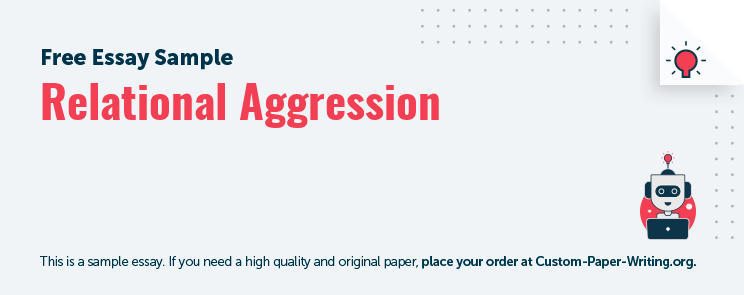
Reddy S., the author of the article “Little Children and Already Acting Mean”, determines and analyzes the notion of relational aggression, its popularity among children, and impacts on their health and behavior (Reddy, 2014). According to the estimation of Sumathi Reddy, “relational aggression” is a relatively new term in the sphere of psychology that is based on the threat of removing friendship as a so-called emotional weapon. The researcher emphasizes that emotional aggression is as serious and dangerous as physical aggression because not only rude behavior, but also unkind words may lead to social exclusion and isolation of children (Reddy, 2014). It is important to note that the author pays attention to arguments of professionals in the sphere of psychology, as well as opinions of teachers and parents. For instance, S. Reddy supports the point of view of L. Klaassen and C. Nixon that girls are usually affected more than boys by relational aggression because they, in the majority of cases, are more socially developed (Reddy, 2014). Furthermore, Sumathi Reddy absolutely agrees with the estimation of Dr. Nixon that relational aggression is a serious weapon because it negatively impacts behavior of children and results in a number of serious health problems, including anxiety and depression (Reddy, 2014). Finally, the author of the article expresses the idea that participation of parents in upbringing of children is tremendously important as parents should guide their children, teach them love, as well as empathy, and explain that relational and physical aggression bring only negative consequences. Assistance of parents and teachers is vital because children have limited cognitive abilities and, consequently, cannot solve all problems on their own (Reddy, 2014).
Calculate the cost of essay
It is important to note that the presented information is supported by solid research data. For example, the author relies on the results of statistics presented by Dr. Nixon, chair of the department of psychology at Penn State Erie. According to available research results, approximately 50% of children and adolescents usually become the victims of relational aggression at least once a month (Reddy, 2014). Besides, the research of Dr. Nixon proves that more than 7% of children of different age experience physical and relational aggression on a daily basis (Reddy, 2014). In my opinion, the article by S. Reddy is not only well-structured, but also includes only truthful data and valid results of statistics. Moreover, the author of the article provides information about more than one side of the issue. The research data included in the article is well-thought and thoroughly interpreted.
Having determined and assessed the main points of view of the article “Little Children and Already Acting Mean”, I would like to state that the information was incredibly fascinating, new, and helpful for my future career. I have found it interesting to get to know that symptoms of relational aggression appear at the very early age among girls and boys who go to schools and kindergartens. Having analyzed my personal experience of a kindergartener, I can say that I have experienced relational aggression at school when two of the boys instigated the other boys not to play football with me because they did not like me. In addition, the research by Jamie Ostrov, who works at the University of Buffalo, about the reasons why some girls are usually more inclined to relational type of aggression inspired me to search additional information on this topic.
Limited time Offer
with code
Information presented in the article by Sumathi Reddy may be applied not only to regional or national current events, but to global as well. For instance, according to the results of statistics provided by the Ophelia Project in 2014, relational aggression is considered to be one of the main causes or stimulators of bullying among children. Furthermore, in 2014, approximately 5% of interviewed victims of relational aggression have thought about suicide as a way out of the problem (The Ophelia Project, 2015). More than 30% of children who have faced relational aggression at schools in the USA within 2014 have suffered from anxieties, depression, low self-esteem, and, finally, diminished social competence and isolation (The Ophelia Project, 2015). In my opinion, relational aggression is closely intertwined with social attention. Small children and adolescents express aggressive behavior in order to get some “status” and feel more “powerful”. Besides, I support the idea that parents and teachers should teach their children how to resolve conflicts in a peaceful way in order not to hurt other children.
Benefit from Our Service: Save 25% Along with the first order offer - 15% discount, you save extra 10% since we provide 300 words/page instead of 275 words/page
Finally, having analyzed the article by Sumathi Reddy about the nature of relational aggression, assessed the validity of author’s arguments, paid attention to importance of this article as well as its informational content, and, finally, reviewed connection between relational aggression and current global events, I would like to stress that it was a pleasure for me to write this paper. I have found it extremely fascinating to read and evaluate solid investigation base presented by the author. To be honest, it was not easy to write this paper because of great information content and numerous requirements. However, I have tried to do my best in order to follow the detailed instructions. As for me, the first and fourth sections were the most tiresome and difficult as they required synthesis of information, as well as personal opinions and reactions. I believe that my preparation for writing this paper was diligent because I have thoroughly read the text, analyzed it, did some external research, and presented personal points of view. Furthermore, I have tried to follow the feedback I received on my previous paper. Finally, I hope that this paper will receive a better mark compared to the previous one because I have tried to do my best to avoid grammar, spelling, and punctuation mistakes, and thoroughly followed the requirements.
- Share this post with your friends:

